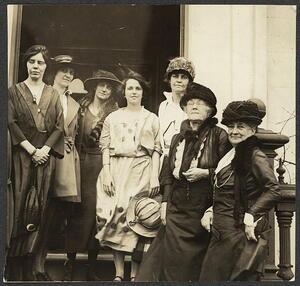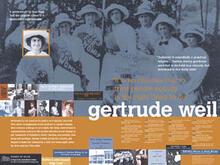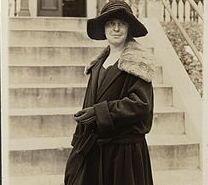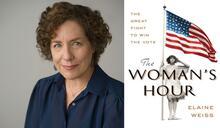Anita Pollitzer
Officers of the National Woman's Party in 1922.
Left to right: Alice Paul, Sue White, Florence Boeckel, Anita Pollitzer (center, holding hat), Mary Winsor, Sophie Meredith, and Mrs. Richard Wainwright.
Photo courtesy of the National Woman's Party and Wikimedia Commons.
As a party organizer for the National Woman’s Party, Anita Pollitzer travelled across the country to earn crucial support for ratifying the Nineteenth Amendment, granting American women the vote. Pollitzer joined the NWP in 1916. During her extensive travels for the NWP, she convinced Tennessee Legislator Harry T. Burn to cast the deciding vote for the Nineteenth Amendment. In 1933 she earned a master’s degree in international law and became vice chair of the World Woman’s Party, working alongside NWP chair Alice Paul. In 1945, Paul stepped down and chose Pollitzer to lead the NWP in her stead.
Article
Born on October 31, 1894, in Charleston, South Carolina, the fourth child of second-generation Eastern European immigrant parents, Clara (Ginzburg) and Gustave Morris Pollitzer, Anita Pollitzer devoted her public life to feminist politics and artistic patronage. Pollitzer’s most prominent contribution to feminism came in 1945, when she became Alice Paul’s hand-picked successor for the chairmanship of the National Woman’s Party (NWP). Pollitzer also gained recognition for her close friendship with Georgia O’Keeffe, whose artistic career blossomed when Pollitzer showed Alfred Stieglitz a series of her paintings. A biography of O’Keeffe by Pollitzer, entitled A Woman on Paper: Georgia O’Keeffe, published after Pollitzer’s death and against O’Keeffe’s wishes, has added significantly to information on the artist’s personal life.
After graduating from Memminger High and Normal School, Pollitzer entered Teachers College at Columbia University, where she majored in art and education. Soon after her graduation in 1916, she became interested in the woman suffrage movement, met Alice Paul, and joined the NWP. As a party organizer traveling through the states for the NWP, she helped ratify the Nineteenth Amendment to the Constitution. Pollitzer demonstrated her commitment to woman suffrage in 1917 by being arrested as a Silent Sentinel picketing the Woodrow Wilson White House. In August 1920, she used her considerable charm to convince legislator Harry T. Burn of Tennessee to cast the deciding vote for the amendment. In 1933, Pollitzer received a master’s degree in international law from Columbia University. Soon after this achievement, she became vice-chair of the World Woman’s Party with Alice Paul.
Pollitzer married Elie Charlier Edson, a free-lance press agent, in 1928. The couple settled in New York City for the duration of both of their lives. Neither earned a substantial salary, causing them to depend upon securities bestowed on her from her relatives and an inheritance from his mother. She remained active both in the arts and in feminist politics throughout most of her life. In 1971, the same year her husband died, she suffered a stroke. She died four years later, on July 3, 1975, in New York City.
BEOAJ; Geboire, Clive, ed. Lovingly, Georgia: The Complete Correspondence of Georgia O’Keeffe and Anita Pollitzer (1990).
Irwin, Inez Haynes. The Story of the Woman’s Party (1921).
National Woman’s Party. Papers. Library of Congress.
NAW modern.
Obituary. NYTimes, July 5, 1975, 20:3.
Pollitzer, Anita. Correspondence with Georgia O’Keeffe. Beinecke Library, Yale University, New Haven, Conn.
Correspondence with Miriam Holden. Princeton University, Princeton, N.J.
A Woman on Paper: Georgia O’Keeffe (1988).
WWIAJ (1928, 1938).
WWWIA 6.






